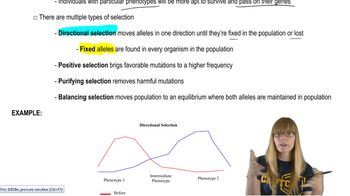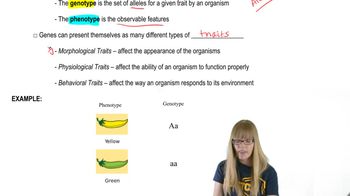Here are the essential concepts you must grasp in order to answer the question correctly.
Natural Selection
Natural selection is a fundamental mechanism of evolution, where individuals with traits better suited to their environment tend to survive and reproduce more than those with less advantageous traits. In the context of the MC1R gene, variations in eumelanin production can influence an individual's adaptability to different environmental conditions, such as UV radiation exposure, which affects skin cancer risk and vitamin D synthesis.
Recommended video:
Eumelanin and Phenotypic Variation
Eumelanin is a type of melanin pigment responsible for dark hair and skin coloration. The variation in MC1R alleles affects the amount of eumelanin produced, leading to different phenotypes. In populations exposed to high UV radiation, darker pigmentation (higher eumelanin) is favored for protection against skin damage, while lighter pigmentation may be advantageous in lower UV environments for better vitamin D synthesis.
Recommended video:
Population Genetics
Population genetics studies the distribution and change in frequency of alleles within populations. The findings of different MC1R alleles in African and European populations suggest that historical environmental pressures, such as UV radiation levels, have shaped the genetic diversity and allele frequencies in these groups, illustrating how local adaptations can lead to significant genetic differences across populations.
Recommended video:
 Verified step by step guidance
Verified step by step guidance Verified video answer for a similar problem:
Verified video answer for a similar problem:

